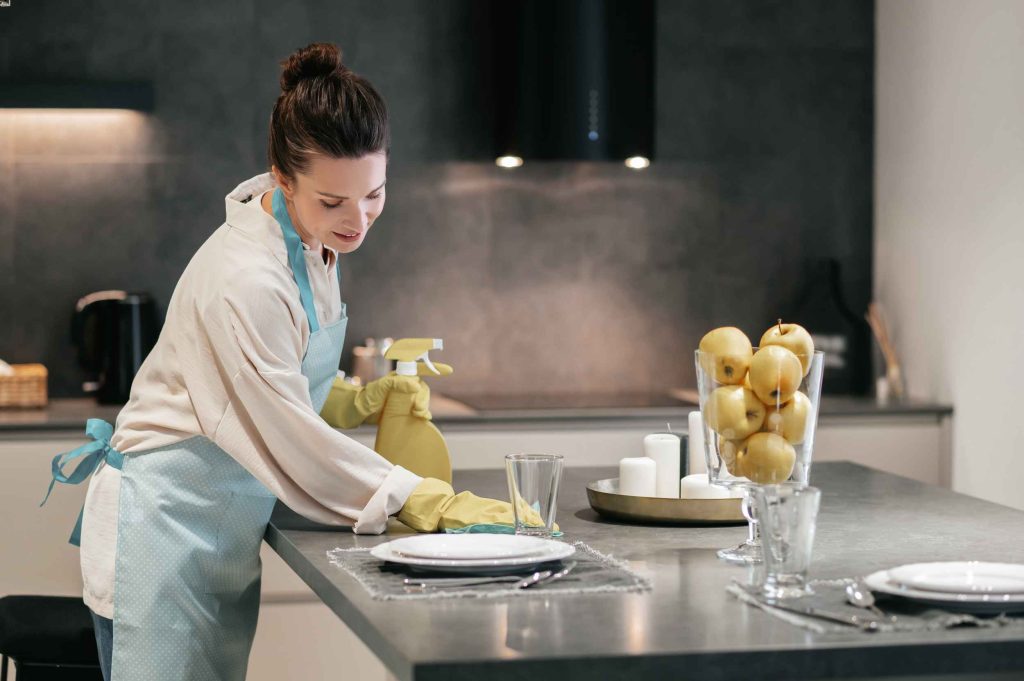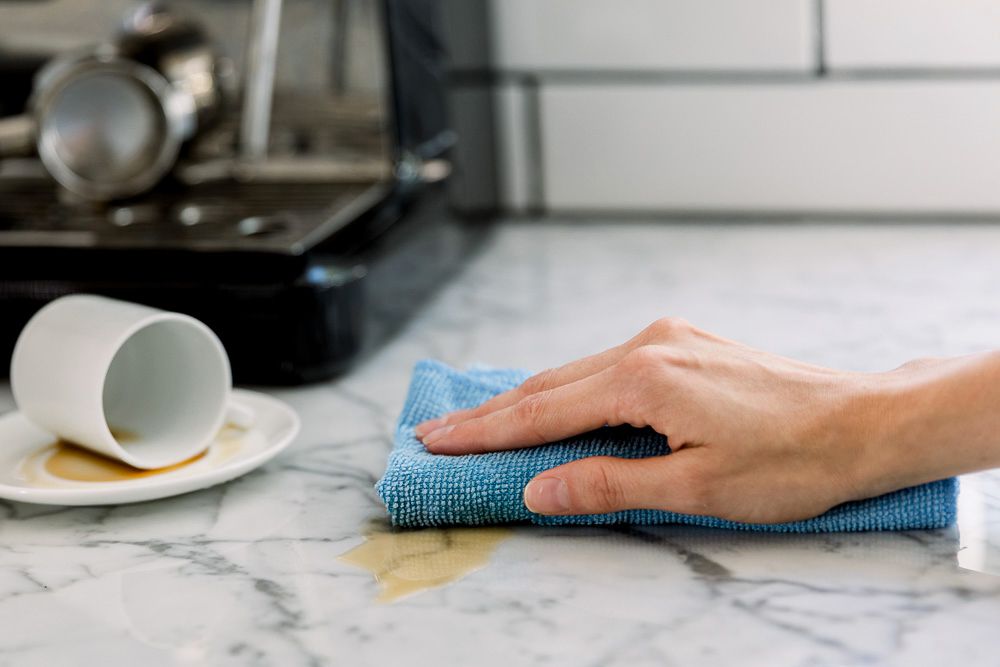Marble is one of the most popular materials used in everyday life. This material has recently been used a lot for countertops in the kitchen due to its positive characteristics, such as shine and ease of maintenance.
Nevertheless, sometimes marble can be damaged for several reasons. Acidic foods, physical damage, and cleaning agents are just some factors that can reduce the life of marble. So, stay with us because we will provide you with useful tips on how to care for marble countertops.
Therefore, without any further ado, let’s get started and discover how you can remove the stubborn stains on the marble countertops.

How to Care for Marble Countertops
Cleaning marble countertops
To properly take care of marble countertops, remember that they are smooth surfaces that you can scratch if you choose an abrasive product. Therefore, using a soap with a neutral pH and a damp cloth is best.
Under no circumstances do not use agents that contain acid in their composition or agents that have an abrasive effect. Also, if your marble countertop gets spilled with food or liquid that could damage it, wipe it off immediately, and don’t leave it that way. The longer a liquid containing acids sits, the more likely it is to stain.
Avoid cleaners that contain acids
Agents containing acids can further damage the marble and leave stains you cannot remove. Therefore, to clean the marble, user agents do not contain acids in their composition. In addition, bleach is also an agent that you should never use when cleaning marble.
Not only that, in addition to cleaning products, many types of food contain acids. Therefore, before preparing food, it is best to protect the marble with a mat that will further protect it from damage.
Use sealers
Sealers are a great solution to help you keep your marble in great shape and avoid stains. By sealing, you create a barrier between the marble and the ingredients and foods you use. After finishing with your kitchen work, remove the sealer with a damp cloth and neutral pH soap.
Protective pads
Cutting and cooking food can scratch and damage the marble. Therefore, when preparing food, it is best to protect the marble countertops with a mat that will protect them from physical damage and scratching.
And not only that, but be sure to use a mat, and if you serve food or drinks on a ceramic mat. Also, if food or drink is spilled on you, it’s best to wipe up the surface immediately to avoid stains.
It is best to clean the marble countertops after each use, which will preserve the quality and longevity of the marble.
Read more: How to Care for Leather Furniture

Stain removal
Even though you regularly take care of the marble, it still sometimes happens that it is covered with residues of food, drinks, and other substances. Such drops can negatively affect the quality of the marble and reduce its quality.
Therefore, when food or liquid is spilled on the marble countertop, immediately take measures to remove it. If stains remain, you need to know the origin of the stain to know what product to use. For this purpose, we will list some of the means used depending on the origin of the stains.
Stains of organic origin
This type of stain refers to coffee, colored drinks, fruit, tea, and other types of food. Stains of organic origin usually have a brownish color, and you will easily recognize them. So, how to take care of the oil stains?
If you face this problem, it is best to use a few drops of ammonia combined with 12% hydrogen peroxide. Remember to use a clean cloth to wipe away the stains. Also, be careful when using this method on darker marble because it can lighten the color.
Oil stains
In addition to cooking oil, such stains also apply to all types of food that have oil in their composition. Namely, peanut butter, fats, milk, creams, and other foods that contain oil, very easily penetrate the structure of the marble and change its color.
If you notice that such stains remain for a long time, you should take measures to remove them. To begin with, use a mild cleanser combined with acetone or ammonia.
If this combination does not work, you need to use a poultice. All you have to do is apply a poultice on the dachas with the oil and leave it on for a day or two.
After that, rinse with warm water and then dry the area. Repeat the procedure if you notice stains or until the area is completely cleaned.
Ink stains
Ink stains can be a problem when it comes to marble. However, there is a solution to overcome this problem. Depending on the type of marble, you need to use an appropriate agent to successfully remove the ink stains.
Therefore, if white marble needs ink stains removed, you should use a hydrogen peroxide solution. If you still need to remove ink stains from black marble, use acetone. After removing the ink, use a soft cloth to remove the agent after cleaning the ink from the marble countertop.
Also read: How to Clean a Wooden Dresser
Conclusion
Finally, we can conclude that marble is one of the most practical and best materials when it comes to kitchen countertops. In addition, keep in mind that diligent and frequent use can affect the quality and durability of this material.
Therefore, the more you take care of it and maintain it, the longer it will last. For that purpose, pay attention to regular cleaning, especially after preparing food or any work in the kitchen.
Prompt cleaning of stains and using appropriate cleaning agents should also be your priority when cleaning the marble countertop. Therefore, abrasive agents and ingredients containing acids can negatively affect the quality of the marble.
Therefore, before cleaning the marble countertop, choose the right product according to the origin of the stain and the type of marble.
And at the very end, we hope that these useful tips help you learn how to care for marble countertops.